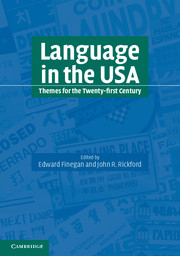Book contents
- Frontmatter
- Contents
- List of figures
- List of tables
- List of contributors
- Acknowledgments
- Foreword
- Editors' preface
- Part 1 American English
- Part 2 Other language varieties
- 7 Multilingualism and non-English mother tongues
- 8 Creole languages: forging new identities
- 9 Native American languages
- 10 Spanish in the Northeast
- 11 Spanish in the Southwest
- 12 American Sign Language
- 13 Asian American voices: language in the Asian American community
- 14 Linguistic diversity and English language acquisition
- Part 3 The sociolinguistic situation
- Index
7 - Multilingualism and non-English mother tongues
Published online by Cambridge University Press: 05 June 2012
- Frontmatter
- Contents
- List of figures
- List of tables
- List of contributors
- Acknowledgments
- Foreword
- Editors' preface
- Part 1 American English
- Part 2 Other language varieties
- 7 Multilingualism and non-English mother tongues
- 8 Creole languages: forging new identities
- 9 Native American languages
- 10 Spanish in the Northeast
- 11 Spanish in the Southwest
- 12 American Sign Language
- 13 Asian American voices: language in the Asian American community
- 14 Linguistic diversity and English language acquisition
- Part 3 The sociolinguistic situation
- Index
Summary
Editors' introduction
Using the metaphors spendthrift and gravedigger, Joshua A. Fishman raises important questions about the USA's lavish disregard of one of its great resources, and he suggests an image of the USA as digging the grave of so many languages and compromising its own well being by doing so. Some of the questions posed in this chapter are rhetorical: asking them is sufficient to suggest their answers.
The USA is constantly recomposing itself as “a nation of immigrants.” While English is widely regarded as the language of mainstream USA, the relegating of other languages spoken by immigrants and their native-born offspring, those languages even of world communities such as Arabic, French, German, Mandarin, Spanish, and Portuguese, to name only a few, are not recognized as great natural and national resources (as they would be viewed in many other parts of the world). In most cases, immigrant languages and those of Native Americans endure not even benign neglect but aggressive discouragement and disparagement. After the terrible events of 9/11, the USA found itself scrambling for citizens fluent in languages that had been long neglected.
As pointed out in this chapter and others (e.g., 9, 10, 11, 13, 14, 17, and 18), immigrant languages in the USA have traditionally experienced an extremely tough time being transmitted into the linguistic repertoires of the grandchildren of immigrants. Except in those very few situations where highly concentrated immigrant communities remained relatively isolated from the English-speaking majority (other than for financial transactions), the USA must be viewed socially as poor soil in its support of language maintenance and transmission.
- Type
- Chapter
- Information
- Language in the USAThemes for the Twenty-first Century, pp. 115 - 132Publisher: Cambridge University PressPrint publication year: 2004
- 7
- Cited by



